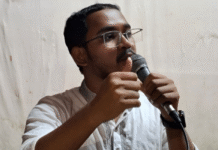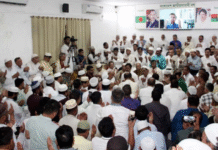
The leadership of Students Against Discrimination (SAD) has yet to be reorganised to fill the void created after its several key leaders left to lead the new party, National Citizen Party.
It has been almost a month since the launch of the NCP, with Hasnat Abdullah, Arif Sohel and Hannan Masud – three key leaders of the SAD – taking on the key roles of the party.
The delay in selecting the new leadership is mainly due to conflicts among its leaders, coupled with non-cooperation from the platform’s past leaders, said SAD insiders.
Consequently, the platform is struggling with a lack of momentum in its activities amid the leadership vacuum, frustrating both its leaders and supporters.
SAD spokesperson Umama Fatema said there is currently no established format for the selection of the new leadership. “The executive committee members held two meetings, but any decision could not be reached.”
On the other hand, several members who attended the meetings, pointed fingers at spokesperson Umama for the meetings being “unsuccessful”.
Jahangirnagar University (JU) SAD spokesperson Maliha Namlah said, “The meetings were not successful because of Umama Fatima’s unwillingness to cooperate. When some aspirants presented themselves as candidates [for new leadership], she argued.”
Asked about the matter, Umama said she cannot recall any such incident.
Maliha also added that the SAD has been in limbo since the formation of the NCP and the Bangladesh Democratic Students Union.
Umama stated that the SAD was supposed to collaborate with other student organisations to work together to shape the future of student politics. “But, the former members have demonstrated extreme selfishness to protect their over-enthusiasm and favoritism.”
After the establishment of the Democratic Student Union and the National Citizen Party, efforts have been made to downsize the platform [SAD], she alleged.
“There was a tendency among the former members to use the platform aligning with their individual preferences.”
However, several executive committee members said at the meetings of SAD’s executive committee and the Special Cell on the July Uprising, the names of Dhaka University student Hasan Enam and Jahangirnagar University’s Maliha Namlah came into discussion as the next convener and member secretary.
They said the platform will work solely with the July movement aspirations, and the leadership will be selected accordingly.
National Citizen Committee at a standstill too
Before forming the NCP, it was stated that the Students Against Discrimination and the National Citizens Committee – which emerged from the SAD at first as a “pressure group” –would be restructured as quickly as possible.
The NCP originated from the leadership of both the two platforms, the SAD and the National Citizens Committee, and was launched on 28 February. However, the central leadership of the Citizens Committee has yet to be restructured.
NCP’s Senior Joint Convener Samanta Sharmin told The Business Standard that the convener, member secretary, chief organiser, and spokesperson of the Citizens Committee had an informal responsibility of 15 days [from 28 February] at the committee at that time. They were supposed to head a forum to select the new organogram of the Citizens Committee, which still remains unimplemented.
Samanta said they are yet to hold any meeting of the remaining members of the committee, and the date still remains uncertain.
Also, she pointed out that no policy has been taken yet regarding shifting the Citizens Committee members to the NCP. “For now, the work of the Citizens’ Committee is at a standstill as all attention is on the new party [NCP].”
Earlier, on 27 February, the Citizens Committee stated in a media release that except for the convener, member secretary, spokesperson, and chief organiser, its remaining organogram – executive committee, cells and search committee – have been declared abolished.
Committee membership of those who joined the NCP will be deemed revoked.
In addition, the process to recruit members to the NCP from the Citizens Committee at all levels, including from its upazila and ward committees, remained unimplemented too.









